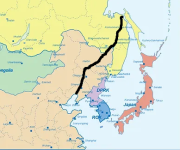- Pronouns
- he/him
Or maybe it needs to go further back, to a less botched Siberian Intervention and avoiding the collapse in relations between the Army and the Diet? (though that might also just involve an earlier case of the army wagging the government dog)
Avoiding the threat of the USSR- either by a White victory leading to a weak government or a mutilated Red victory- might certainly take the heat out of many of the radical army officers.
Conversely, strengthening China weakens Japanese power but potentially strengthens Japanese diplomacy. A China that avoids the Warlord Era will be took weak to be a threat but too strong for local Japanese officers to unilaterally intervene; if we combine that with a weakened USSR you get a Japan that doesn't have any natural avenues of expansion in the twenties and thirties. It's possibly a very bitter and toxic politics, but it would be hard to get on the escalatory ladder of small expeditions eventually taking you to Marco Polo and through to Pearl Harbour.


